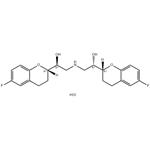Efficacy in Hypertension/Heart Failure and PK Insights of Nebivolol Hydrochloride
Oct 14,2025
Nebivolol hydrochloride is used alone or together with other medicines to treat high blood pressure (hypertension). High blood pressure adds to the workload of the heart and arteries. If it continues for a long time, the heart and arteries may not function properly. This can damage the blood vessels of the brain, heart, and kidneys, resulting in a stroke, heart failure, or kidney failure. High blood pressure may also increase the risk of heart attacks. These problems may be less likely to occur if blood pressure is controlled. Nebivolol hydrochloride is a beta-blocker. It works by affecting the response to nerve impulses in certain parts of the body, like the heart. As a result, the heart beats slower and decreases the blood pressure. When the blood pressure is lowered, the amount of blood and oxygen is increased to the heart.

Nebivolol hydrochloride in the treatment of chronic heart failure
The pathophysiology of chronic heart failure involves a process of left ventricular remodeling, whereby molecular changes occur within the myocardium in response to mechanical stresses induced by underlying diseases, such as hypertension, ischemic heart disease, cardiomyopathies, and valvular abnormalities. Structural changes that occur, including left ventricular hypertrophy and/or dilation, typically result in decreased left ventricular diastolic or systolic function. Nebivolol hydrochloride is a third-generation beta-adrenergic blocker that has been marketed and used in Europe for the treatment of hypertension and heart failure. It is currently under FDA review in the US for hypertension and it is anticipated that an indication for heart failure will be pursued in the near future. There is evidence to suggest that this mechanism is in part due to agonist activity of nebivolol at endothelial beta3-adrenergic receptors. This was recently tested and confirmed by Dessy and colleagues who established that Nebivolol hydrochloride relaxation of human coronary microarteries that were precontracted with endothelin-1 was significantly inhibited by bupranolol, a beta1,2,3-receptor blocker, but not significantly inhibited by nadolol, a beta1,2-receptor blocker. Nitric oxide bioavailability may also be augmented with nebivolol treatment due to decreased inactivation by reactive oxygen entities.[1]
Nebivolol is currently marketed in Europe for the treatment of hypertension and heart failure and is under FDA review for use in the US. Evidence shows that Nebivolol hydrochloride, titrated to a maximum dose of 10 mg, is a potentially promising therapeutic option for the treatment of chronic heart failure when added to standard therapy. Its unique mechanism of selectively blocking beta1-receptors and decreasing peripheral vascular resistance by enhancing nitric oxide bioavailability distinguish it from other agents in its class; however the clinical significance of this still needs to be defined. Since not all beta-adrenergic blockers have proved to be effective for the treatment of heart failure, the addition of Nebivolol hydrochloride to the current armamentarium of carvedilol, metoprolol succinate, and bisoprolol is encouraging and provides more options for individualizing patient therapy. Specifically, and in light of recent evidence for other agents known to work via the nitric oxide pathway, Nebivolol hydrochloride may prove to be more useful than other beta-adrenergic blockers in African American patients and those suspected of having decreased nitric oxide bioavailability as an underlying pathophysiology of disease.
New Data for Nebivolol hydrochloride after In Silico PK Study
Nebivolol hydrochloride is a third-generation β-blocker drug, a β-adrenergic receptor antagonist with high selectivity for β1-adrenergic receptors. In addition, it has a vasodilating effect mediated by the endothelial L-arginine/nitric oxide (NO) pathway. This dual mechanism, responsible for the haemodynamic profile, explains the prominence given to this drug within the β-blocker family. It plays a key role in cardiovascular therapy, having been widely used for hypertension and chronic heart failure treatments. In fact, its ability to prevent increased pulse rate and control heart pumping is reported, in addition to its vasodilating action on blood vessels. Nebivolol hydrochloride is effective in lowering BP either in monotherapy or in combination and has a distinct pharmacological profile. Its main characteristic is the different effect on bioavailability on different metabolizers (EM, IM, PM). The age-dependence effect of this drug has been studied less. Data regarding this matter is scarce, and the reduction of AEs is difficult if these details are not well described. In our study, we demonstrated that a 6 mg dose q36 h has better chances of being effective and safe in comparison with other regimens. Further research is necessary to understand the full mechanism of this drug and the covariates affecting its efficacy and safety.[2]
References
[1]Veverka A, Salinas JL. Nebivolol in the treatment of chronic heart failure. Vasc Health Risk Manag. 2007;3(5):647-54. PMID: 18078016; PMCID: PMC2291309.
[2]Marques L, Costa B, Vale N. New Data for Nebivolol after In Silico PK Study: Focus on Young Patients and Dosage Regimen. Pharmaceutics. 2022 Sep 9;14(9):1911. doi: 10.3390/pharmaceutics14091911. PMID: 36145659; PMCID: PMC9502491.
- Related articles
- Related Qustion
Rifamycin O, an RNA polymerase inhibitor, treats E. coli-induced traveler's diarrhea and shows promise against M. abscessus.....
Oct 14,2025APIMethyl 3-hydroxypropanoate is synthesized via Co-catalyzed ethylene oxide carbonylation and its thermolysis in m-xylene is favored by solvent interactions.....
Oct 14,2025APINebivolol hydrochloride
152520-56-4You may like
Nebivolol hydrochloride manufacturers
- Nebivolol hydrochloride
-

- 2025-10-15
- CAS:152520-56-4
- Min. Order:
- Purity: 0.99
- Supply Ability:
- Nebivolol hydrochloride
-

- $0.00 / 1g
- 2025-10-15
- CAS:152520-56-4
- Min. Order: 1g
- Purity: 98%-102%
- Supply Ability: 10KGS
- Nebivolol hydrochloride
-

- $59.00 / 25mg
- 2025-10-15
- CAS:152520-56-4
- Min. Order:
- Purity: 99.85%
- Supply Ability: 10g






